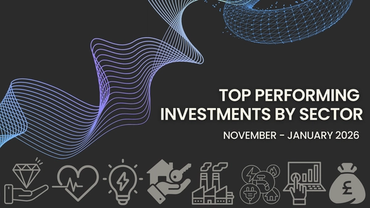Trip notes: on the road with Baillie Gifford China Growth Trust
By Sophie Earnshaw, Joint Manager, Baillie Gifford China Growth Trust, and Nicholas Pink, Chair, Baillie Gifford China Growth Trust
6 Oct, 2025
This section is a paid promotion created in partnership with Baillie Gifford. The views and information presented reflect the sponsor’s messaging and may not represent the independent opinions of Boring Money. While we aim to ensure accuracy and relevance, this content should not be considered impartial advice.
As with any investment, your capital is at risk.

Sophie Earnshaw, joint manager:
The timing turned out rather well. Typically, boards accompany trust managers on investment trips every two or three years. Largely because of China’s long Covid hangover, February was our first chance for a board-and-managers visit since 2020, when Baillie Gifford took over the management of the Trust.
As luck would have it, we arrived days after state TV showed the famous handshake between President Xi Jinping and Jack Ma. The Alibaba founder had been a near pariah for five years and, according to many, it signalled Beijing’s re-embrace of private sector energy.
That political stagecraft, hard on the heels of DeepSeek’s sensational unveiling of its low-cost AI model, heightened the buzz I’d sensed the previous year, stirred by policy moves to reverse the downturn. So, a good historical moment to share with the board.
Shanghai, Shenzhen, Beijing: three very different hubs of Chinese growth, five days packed with company meetings, briefings from China specialists, 2,000 miles of internal flights and hundreds more by minibus and taxi.
My highlights? Two stick out: road-testing Horizon Robotics’ self-driving cars in the capital’s rush hour. And the surprise birthday party my fellow manager Linda Lin kindly laid on at a Haidilao hotpot restaurant – one of our thriving portfolio companies.
Our trip started at Baillie Gifford’s Shanghai office, which has transformed our China operations since it opened in 2019. The team there, plus invited economists and other outside experts, briefed us ahead of our three-city meetings marathon.
Quality conversations
From chip maker AMEC in Shanghai to consumer electronics company Anker in Shenzhen to home-delivery powerhouse Meituan in Beijing, it was good for the board to get better acquainted with about a quarter of our portfolio companies – and with us. Helped by Linda’s bulging contacts book and the efforts of our fantastic head of corporate engagement, Ningyuan Tang, we saw an impressive turnout of leaders and founders.
You might suppose the extra bodies in the room for those meetings would change the dynamic. Not so. The bosses answered freely as we probed their manufacturing operations, technology use, competitive pressures and more. As always, we sought reassurance about where growth was coming from over the next five to 10 years.
Chinese cultural barriers don’t apply when meeting our kind of businesses. Their leaders’ English is fluent, and the dress code is chinos and blazers, not suits. Anker founder Meng Yang, a former Google software engineer, wore a hoodie. Everyone seemed happy for us to interrogate the investment case and even gave wider views of current geopolitical tensions.
Suffice it to say that no one thinks the sky will fall in because of Washington’s restrictions on Chinese imports. They have long since considered how to mitigate that. In any case, we don’t own many big exporters.
Some meetings reinforced the potential benefits of ‘domestic substitution’ of imported parts in Chinese supply chains. That’s now likely to accelerate, possibly leapfrogging western technologies, as BYD has done with electric vehicles.
For example, US export restrictions on NVIDIA’s AI-focused H20 chip may accelerate a switch to domestic semiconductors. Or so said the heads of AMEC, which makes wafer fabrication equipment. They told us how sanctions were spurring innovation. BYD told us that securing parts domestically had become a matter of survival.
How long will it be before US trade restrictions on chip sales result in genuine innovation here? Chinese chip makers are already attempting to ‘do a DeepSeek’, finding an unexpected route to cracking the seven-nanometre transistor miniaturisation barrier that gives the Americans, Taiwanese and South Koreans their lead.
Looking back, I’ll remember this trip as an excellent opportunity to swap notes and learn from the board’s multifaceted experience. It was also a chance to savour jointly the great paradox of China: that the world’s biggest communist state is also the most ruthlessly and creatively competitive.
Nicholas Pink, chair:
There’s a notion that investment trust boards only meet managers for lunch every quarter to ask probing questions. After spending a working week in China, having breakfast, lunch and supper with Sophie and Linda, not to mention much pre- and post-meeting analysis in a traffic-bound minibus, I can vouch that it’s a lot more than that.
Why did the board – Sarah MacAulay, Tim Clissold, Magdalene Miller, Jonathan Silver and myself – think it important to join this trip?
All of us have worked in China for almost 30 years, in roles including fund manager, chief financial officer of an industrial company, private equity and investment research.
We’ve all been appointed since Baillie Gifford took over the management of the Trust. We wanted to look closely at the capabilities of their operation, meet companies with our managers and see how that feeds into what we’re all trying to achieve for shareholders.
This manager-board relationship is one reason I love investment trusts. To me, it’s about joint problem-solving. But not just that. It’s also drawing on the board’s breadth of experience to spot opportunities.
Being ‘invisible onlookers’ on a normal round of company meetings enhanced that, helping us understand how the managers work. What sort of questions were they asking founders and leaders?
It was also a chance to meet the team in Shanghai and some of the third-party consultants, who help differentiate Baillie Gifford’s approach. In a former life, I’ve managed investment research teams in China and know how critical it is to synthesise local knowledge with the wider firm’s culture and process.
Getting it right is hard work. We came away impressed with how the talented analysts there generate investment ideas for the managers to sift through, and the extent of the due diligence they perform on companies.
We met a substantial sample of the portfolio, and some prospective additions. Together, we discussed their answers, notably their strategic preparedness for trade disruption with the US.
A different approach to company meetings
The whole board was struck by how distinctive the Baillie Gifford style really is. It’s easy to talk up your long-time focus on companies capable of doubling in size, etc, but in practice that thinking really does dominate. Last quarter’s results, or projections for next year, were barely mentioned in company meetings.
It was a while since I’d been to China. In the little spare time we had, I wandered around to gauge the atmosphere. Sophie has a good line about how we’re moving from the era of ‘made in China’ to ‘invented in China’. At street level, it’s easy to see how the scale and dynamism of these great cities drive so much innovation and competition to make better products and services.
China seems to me increasingly the place to glimpse the future: whether that’s the Anker robot vacuum cleaners (I bought one when I got home!), Horizon Robotics’ driverless cars, WeChat and Alipay’s dominance of payment services, or Meituan’s delivery (and multiple other) services. Everyone seems to live in their digital ecosystems.

Collectable toy Labubu helped Pop Mart double its revenue to $1.8bn in 2024.
Many innovators in our portfolio have no equivalent in the west. One such is Pop Mart, which sells collectable figurines in ‘blind boxes’, so you don’t know what you’re getting. You can find their outlets in the UK now but, in a spare hour in Beijing, I went to one of their busy shops to get something for the family.
Anyone who remembers the thrill of mystery toys in the cereal packets of childhood understands the feelgood factor: boyfriends and girlfriends, grandparents and grandchildren were treating each other with Chinese-designed character products that owe nothing to Disney, Harry Potter or Japanese pop culture.
Meituan’s ubiquity as a facilitator of everyday life was also a surprise. Our hotel concierge turned to the app to make restaurant arrangements for our last night. Linda used it to order a birthday cake for Sophie and deliver it to our restaurant, complete with candles and dimmed lights, one woman with a neon Happy Birthday sign, another waving pompoms. We all clapped along.
Another stand-out moment for me was discovering that the statue in the lobby of chip maker AMEC, which I’d assumed to be a Chinese notable, was in fact Andrew Grove, co-founder of Intel, the AMEC boss’s former employer. A further reminder to forget preconceptions of limits to Chinese companies’ ambitions.
Concluding thoughts? Reassurance for the board that Sophie and Linda are sticking with such conviction to their style of investing in the disruptive growth companies of the future. That approach, like Jack Ma, is enjoying a renaissance. This is now evident in terms of performance. It must have been an emotionally challenging period, but the managers absolutely had the courage of their convictions.
Baillie Gifford China Growth Trust – annual discrete performance
| 2021 | 2022 | 2023 | 2024 | 2025 |
Share price (%) | 49.1 | -33.4 | -33.6 | -7.9 | 24.9 |
Index* (%) | 14.4 | -15.1 | -21.6 | -3.6 | 17.6 |
Past performance is not a guide to future returns.
Source: Morningstar, MSCI. Total return in sterling. As at 30 June each year. *Changed from MSCI AC Asia Pacific Index to MSCI China All Shares Index on 16 September 2020.
---
Important information
Baillie Gifford China Growth Trust invests in China, where potential issues with market volatility, political and economic instability, including the risk of market shutdown, trading, liquidity, settlement, corporate governance, regulation, legislation and taxation could arise, resulting in a negative impact on the value of your investment. Investments in China are often through contractual structures that are complex and could be open to challenge.
The views expressed in this article should not be considered as advice or a recommendation to buy, sell or hold a particular investment. The article contains information and opinion on investments that does not constitute independent investment research, and is therefore not subject to the protections afforded to independent research.
Some of the views expressed are not necessarily those of Baillie Gifford. Investment markets and conditions can change rapidly, therefore the views expressed should not be taken as statements of fact nor should reliance be placed on them when making investment decisions.
Baillie Gifford & Co Limited is wholly owned by Baillie Gifford & Co. Both companies are authorised and regulated by the Financial Conduct Authority and are based at: Calton Square, 1 Greenside Row, Edinburgh EH1 3AN.
The investment trusts managed by Baillie Gifford & Co Limited are listed on the London Stock Exchange and are not authorised or regulated by the Financial Conduct Authority.
A Key Information Document is available by visiting bailliegifford.com.






